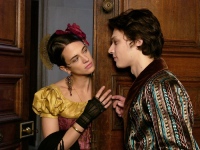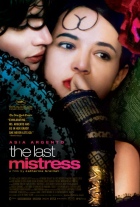The Last Mistress (Une vieille maîtresse)
|  Especially after her last film, the outrageously shocking and, some might say, pretentiously grating Anatomy of Hell (2004), Catherine Breillat’s The Last Mistress (Une vieille maîtresse) seems positively mainstream. Dressed up in the lavish ornamentation of a 19th-century period piece about the bawdy French aristocracy, the themes of gender war, hypocrisy, and the irresistible lure of lust are familiar Breillat territory, although setting them in the past seems to calcify their enormity, as if Breillat is going back in time as a way of emphasizing the persistence of human folly. Especially after her last film, the outrageously shocking and, some might say, pretentiously grating Anatomy of Hell (2004), Catherine Breillat’s The Last Mistress (Une vieille maîtresse) seems positively mainstream. Dressed up in the lavish ornamentation of a 19th-century period piece about the bawdy French aristocracy, the themes of gender war, hypocrisy, and the irresistible lure of lust are familiar Breillat territory, although setting them in the past seems to calcify their enormity, as if Breillat is going back in time as a way of emphasizing the persistence of human folly.The film’s international selling point is the collaboration between Breillat and her star, Asia Argento, who shares with her director a sense of fearless provocation and brute honesty as defining characteristics of her art. Argento plays a Spanish courtesan named La Vellini, who is introduced stretched out on a daybed, the lush comfort of her surroundings offset by her surly demeanor, suggesting that she is not a woman to be trifled with and that she has reached her place in life by pure force of will. At other points, we see her brutishly puffing on a cigar and exchanging a highly sexualized kiss with her maid; she is, in every sense, a mess of contradictions whose intractable nature is her sole source of strength in a world that is constantly trying to corral her, which extends to the film’s setting. Simply put, she doesn’t look like she belongs in a period piece--it’s as if she slipped through a crack in the space-time continuum from a more modern world--which Breillat emphasizes via Argento’s slightly off-center wardrobe choices and a brief glimpse of her lower-back tattoo, which might be written off as a goof if it didn’t seem so intentional. The story, which was taken from an 1851 novel by the French dandy Jules-Amédée Barbey d’Aurevilly, centers of the love/hate affair between Vellini and Ryno de Marigny (newcomer Fu’ad Ait Aattou), a penniless libertine several years her junior who is now on the cusp of marrying Hermangarde (Roxane Mesquida), the wealthy and virginal daughter of an aristocratic family. Ryno is a genuine rake, without a strand of moral fiber in his body, and his carefree insouciance is perfectly embodied in Aattou’s slender frame and pouty lips, which make him seem more feminine than Vellini. Not surprisingly, all of French high society (which is embodied by a pair of gossipy nobles played by Michael Lonsdale and Yolande Moreau) is talking about the potential scandal, and Ryno is eventually confronted by Hermangarde’s open-minded grandmother (Anne Parillaud) about his relationship with Vellini. Ryno’s story, which takes up a good third of the film’s running time, details how he and Vellini came to be passionate lovers, although said passion was initially born out of the hatred engendered by Ryno casually referring to Vellini as an “ugly mutt” (in d’Aurevilly’s novel Vellini is quite homely, and while Breillat certainly emphasizes the dark circles under Argento’s eyes and keeps her constantly scowling, she is clearly a dark, earthy beauty). Ryno is naturally aroused and challenged by Vellini’s hatred of him, and he takes to pursuing her with the kind of reckless abandon that eventually lands him in a duel with her aged husband. The fact that Vellini’s change of heart occurs while a doctor is wrenching the bullet out of Ryno’s chest and she bursts into the room to lick the blood off his skin is the film’s most visually shocking moment, although its function in the narrative is awkward at best. The affair between Ryno and Vellini stretches out over a decade, and the question is whether or not he can ever truly give her up to be with Hermangarde, whom he professes to love like he has loved no other. The clash between the head and the heart is always fertile territory, and while Breillat has mined this turmoil before, it would seem that The Last Mistress would offer her an intriguing new angle to explore. She never backs away from intensity of true passion, and there are moments in The Last Mistress that are as raw and striking as anything she has done (I am thinking particularly of an anguished funeral pyre sequence that takes place in a desert), yet the film as a whole maintains an uneasy distance that always keeps the characters at arm’s length. While the effective slow-burn nature of the story never lags and keeps enough narrative twists in store to maintain interest right up to the inevitable conclusion, the characters ultimately feel more like pawns to be manipulated, rather than flesh-and-blood human beings who suffer and love, which gives the film’s message that the two are essentially one in the same a rather hollow ring. Copyright ©2008 James Kendrick Thoughts? E-mail James Kendrick All images copyright © IFC Films |
Overall Rating: 

 (2.5)
(2.5)


